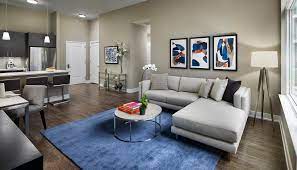
The Benefits of Apartment Living
Living in an apartment offers a unique lifestyle that comes with various benefits. Whether you’re a young professional, a student, or a retiree, apartments provide convenience, affordability, and community living.
Convenience
One of the main advantages of apartment living is the convenience it offers. Apartments are typically located in urban areas close to amenities such as shops, restaurants, public transportation, and entertainment venues. This proximity makes daily tasks like grocery shopping or dining out much easier and more accessible.
Affordability
Apartment living is often more affordable than owning a house. Renting an apartment usually involves lower monthly costs compared to mortgage payments, property taxes, and maintenance expenses associated with homeownership. Additionally, utilities and maintenance costs may be included in the rent, making budgeting simpler for tenants.
Community Living
Living in an apartment complex provides opportunities for social interaction and community engagement. Many apartments offer shared amenities such as fitness centers, swimming pools, communal spaces, and organized events that foster a sense of community among residents. This can lead to meaningful connections with neighbors and create a supportive living environment.
Low Maintenance
Apartment living often means less maintenance responsibilities for tenants. Property management companies or landlords are typically responsible for repairs, landscaping, and common area upkeep. This allows residents to enjoy their living space without the stress of maintaining a house and yard.
Flexibility
Renting an apartment provides flexibility for individuals who may need to relocate for work or personal reasons. Lease terms are usually shorter than mortgage agreements, allowing tenants to move more easily if needed. This flexibility is especially beneficial for young professionals or students who may have changing life circumstances.
In conclusion, apartments offer numerous benefits that cater to diverse lifestyles and preferences. From convenience and affordability to community living and low maintenance requirements, apartment living can be an attractive option for many individuals seeking a comfortable and engaging living experience.
Common Questions About Renting an Apartment: Rent, Utilities, Pets, Parking, Amenities, and Lease Terms
- What is the monthly rent for the apartment?
- What utilities are included in the rent?
- Are pets allowed in the apartment?
- Is there parking available for residents?
- What amenities are offered in the apartment complex?
- What is the lease term and are there any additional fees?
What is the monthly rent for the apartment?
One of the most frequently asked questions when considering an apartment is, “What is the monthly rent for the apartment?” The monthly rent for an apartment varies depending on factors such as location, size, amenities, and market demand. Rent prices can fluctuate based on the neighborhood’s popularity, proximity to urban centers, and the quality of the apartment complex. It’s essential for prospective tenants to inquire about the monthly rent upfront to determine if it fits within their budget and aligns with their desired living standards.
What utilities are included in the rent?
When considering renting an apartment, a common question that arises is, “What utilities are included in the rent?” The answer to this question can vary depending on the specific rental agreement and the policies of the landlord or property management company. Typically, utilities such as water, sewer, and trash removal are commonly included in the rent. Some apartments may also cover electricity, gas, or heating costs. It’s important for prospective tenants to clarify which utilities are included in the rent to budget effectively and avoid any surprises when it comes to monthly expenses.
Are pets allowed in the apartment?
One of the frequently asked questions regarding apartments is whether pets are allowed in the living space. This concern is important for many individuals who have furry companions as part of their family. The pet policy of an apartment complex can vary widely, with some places allowing all types of pets, while others may have restrictions based on size, breed, or number of pets. It’s essential for prospective tenants to inquire about the pet policy before signing a lease to ensure that both they and their pets will feel welcomed and comfortable in their new home.
Is there parking available for residents?
Parking availability for residents is a common concern when considering an apartment. Many apartment complexes provide designated parking spaces for residents, either in a parking lot or a parking garage. Some apartments may offer assigned parking spots, while others have open parking on a first-come, first-served basis. It’s important to inquire about the parking situation when researching apartments to ensure that there are adequate and convenient parking options available for residents and their guests.
What amenities are offered in the apartment complex?
Prospective tenants often inquire about the amenities offered in an apartment complex to assess the quality of living and convenience it provides. Common amenities in apartment complexes may include fitness centers, swimming pools, communal lounges, on-site laundry facilities, parking spaces, outdoor recreational areas, and security features such as gated access or surveillance cameras. These amenities contribute to the overall lifestyle experience and comfort of residents, offering opportunities for relaxation, socialization, and convenience within the community. Understanding the available amenities can help individuals choose an apartment complex that aligns with their preferences and enhances their daily living experience.
What is the lease term and are there any additional fees?
When considering renting an apartment, one frequently asked question is about the lease term and any additional fees involved. The lease term typically outlines the duration of the rental agreement, which can vary from a few months to a year or more. It is important for tenants to understand the length of the lease to plan their stay accordingly. Additionally, landlords may require security deposits, application fees, pet fees, or utilities not included in the rent. These additional fees should be clearly outlined in the lease agreement to avoid any surprises for tenants. Understanding the lease term and associated fees is crucial in making an informed decision when renting an apartment.
